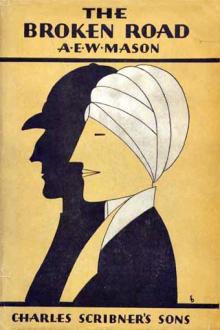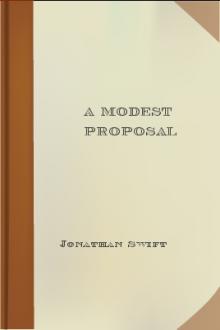The Devil's Dictionary by Ambrose Bierce (good novels to read in english TXT) 📗

- Author: Ambrose Bierce
Book online «The Devil's Dictionary by Ambrose Bierce (good novels to read in english TXT) 📗». Author Ambrose Bierce
PRECIPITATE, adj. Anteprandial.
Precipitate in all, this sinner Took action first, and then his dinner.Judibras
PREDESTINATION, n. The doctrine that all things occur according to programme. This doctrine should not be confused with that of foreordination, which means that all things are programmed, but does not affirm their occurrence, that being only an implication from other doctrines by which this is entailed. The difference is great enough to have deluged Christendom with ink, to say nothing of the gore. With the distinction of the two doctrines kept well in mind, and a reverent belief in both, one may hope to escape perdition if spared.
PREDICAMENT, n. The wage of consistency.
PREDILECTION, n. The preparatory stage of disillusion.
PRE-EXISTENCE, n. An unnoted factor in creation.
PREFERENCE, n. A sentiment, or frame of mind, induced by the erroneous belief that one thing is better than another.
An ancient philosopher, expounding his conviction that life is no better than death, was asked by a disciple why, then, he did not die. "Because," he replied, "death is no better than life."
It is longer.
PREHISTORIC, adj. Belonging to an early period and a museum. Antedating the art and practice of perpetuating falsehood.
He lived in a period prehistoric, When all was absurd and phantasmagoric. Born later, when Clio, celestial recorder, Set down great events in succession and order, He surely had seen nothing droll or fortuitous In anything here but the lies that she threw at us.Orpheus Bowen
PREJUDICE, n. A vagrant opinion without visible means of support.
PRELATE, n. A church officer having a superior degree of holiness and a fat preferment. One of Heaven's aristocracy. A gentleman of God.
PREROGATIVE, n. A sovereign's right to do wrong.
PRESBYTERIAN, n. One who holds the conviction that the government authorities of the Church should be called presbyters.
PRESCRIPTION, n. A physician's guess at what will best prolong the situation with least harm to the patient.
PRESENT, n. That part of eternity dividing the domain of disappointment from the realm of hope.
PRESENTABLE, adj. Hideously appareled after the manner of the time and place.
In Boorioboola-Gha a man is presentable on occasions of ceremony if he have his abdomen painted a bright blue and wear a cow's tail; in New York he may, if it please him, omit the paint, but after sunset he must wear two tails made of the wool of a sheep and dyed black.
PRESIDE, v. To guide the action of a deliberative body to a desirable result. In Journalese, to perform upon a musical instrument; as, "He presided at the piccolo."
The Headliner, holding the copy in hand, Read with a solemn face: "The music was very uncommonly grand— The best that was every provided, For our townsman Brown presided At the organ with skill and grace." The Headliner discontinued to read, And, spread the paper down On the desk, he dashed in at the top of the screed: "Great playing by President Brown."Orpheus Bowen
PRESIDENCY, n. The greased pig in the field game of American politics.
PRESIDENT, n. The leading figure in a small group of men of whom— and of whom only—it is positively known that immense numbers of their countrymen did not want any of them for President.
If that's an honor surely 'tis a greater To have been a simple and undamned spectator. Behold in me a man of mark and note Whom no elector e'er denied a vote!— An undiscredited, unhooted gent Who might, for all we know, be President By acclamation. Cheer, ye varlets, cheer— I'm passing with a wide and open ear!Jonathan Fomry
PREVARICATOR, n. A liar in the caterpillar state.
PRICE, n. Value, plus a reasonable sum for the wear and tear of conscience in demanding it.
PRIMATE, n. The head of a church, especially a State church supported by involuntary contributions. The Primate of England is the Archbishop of Canterbury, an amiable old gentleman, who occupies Lambeth Palace when living and Westminster Abbey when dead. He is commonly dead.
PRISON, n. A place of punishments and rewards. The poet assures us that—
"Stone walls do not a prison make,"but a combination of the stone wall, the political parasite and the moral instructor is no garden of sweets.
PRIVATE, n. A military gentleman with a field-marshal's baton in his knapsack and an impediment in his hope.
PROBOSCIS, n. The rudimentary organ of an elephant which serves him in place of the knife-and-fork that Evolution has as yet denied him. For purposes of humor it is popularly called a trunk.
Asked how he knew that an elephant was going on a journey, the illustrious Jo. Miller cast a reproachful look upon his tormentor, and answered, absently: "When it is ajar," and threw himself from a high promontory into the sea. Thus perished in his pride the most famous humorist of antiquity, leaving to mankind a heritage of woe! No successor worthy of the title has appeared, though Mr. Edward Bok, of The Ladies' Home Journal, is much respected for the purity and sweetness of his personal character.
PROJECTILE, n. The final arbiter in international disputes. Formerly these disputes were settled by physical contact of the disputants, with such simple arguments as the rudimentary logic of the times could supply—the sword, the spear, and so forth. With the growth of prudence in military affairs the projectile came more and more into favor, and is now held in high esteem by the most courageous. Its capital defect is that it requires personal attendance at the point of propulsion.
PROOF, n. Evidence having a shade more of plausibility than of unlikelihood. The testimony of two credible witnesses as opposed to that of only one.
PROOF-READER, n. A malefactor who atones for making your writing nonsense by permitting the compositor to make it unintelligible.
PROPERTY, n. Any material thing, having no particular value, that may be held by A against the cupidity of B. Whatever gratifies the passion for possession in one and disappoints it in all others. The object of man's brief rapacity and long indifference.
PROPHECY, n. The art and practice of selling one's credibility for future delivery.
PROSPECT, n. An outlook, usually forbidding. An expectation, usually forbidden.
Blow, blow, ye spicy breezes— O'er Ceylon blow your breath, Where every prospect pleases, Save only that of death.Bishop Sheber
PROVIDENTIAL, adj. Unexpectedly and conspicuously beneficial to the person so describing it.
PRUDE, n. A bawd hiding behind the back of her demeanor.
PUBLISH, n. In literary affairs, to become the fundamental element in a cone of critics.





Comments (0)